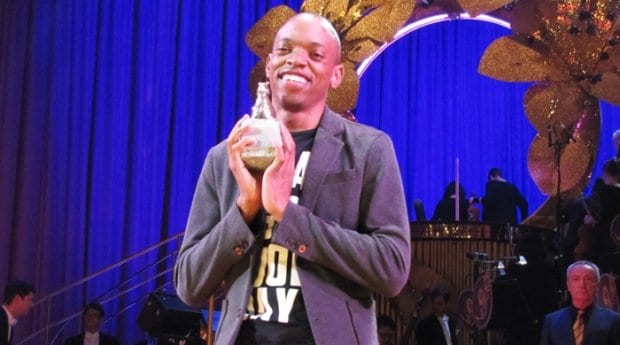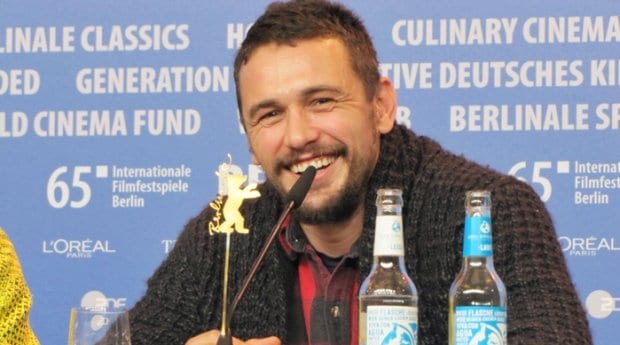
Director Jim Chuchu accepting his award for Story of Our Lives.
Unexpected sexual awakenings and thorny life circumstances were the hallmarks of the LGBT films at this year’s Berlin International Film Festival, which wrapped up Feb 16 after a 10-day showcase of the best and boldest new gay films from around the world.
Known to attendees as the Berlinale, the February film fest isn’t gay-focused per se (and indeed presents more than 400 movies at the broader festival every year) but prides itself on offering one of the most diverse, innovative and international LGBT lineups of any cinematic event on the planet.
Gay content was even more prominent than usual at the 65th Berlinale, with some 26 full-length films and more than 10 shorter films hailing everywhere from Kenya to Lithuania and from Taiwan to Uruguay. Of the just 19 esteemed films in competition for the Berlinale’s top prize, The Golden Bear, an impressive three dealt with sexuality and gender issues: Laura Bispuri’s The Sworn Virgin (Vergine Giurata), about an Albanian trans man who experiences a later-in-life gender-identity crisis; Peter Greenaway’s Eisenstein in Guanajuato, about filmmaker Sergei Eisenstein’s sexual awakening in Mexico; and Phan Dang Di’s Big Father, Small Father and Other Stories (Cha và con và), about a secretly gay, young photography student living in the homophobic lower echelons of Vietnamese society.
As they have since 1987, the Teddy Awards honoured the best LGBT-themed films at this year’s Berlinale, in a star-studded ceremony held on Feb 13. South America fared very well at the 2015 Teddys, with Chilean director Sebastián Silva’s Nasty Baby taking home the prize for Best Feature Film, Uruguayan director Aldo Garay’s The New Man (El Hombre Nueve) winning for Best Documentary, and Chilean director Omar Zúñiga Hidalgo’s San Cristóbal receiving the award for Best Short. Meanwhile, Jim Chuchu’s Stories of Our Lives from Kenya took the Jury Award, and out German actor Udo Kier received a Special Teddy for his long and illustrious career.
Local Berlin monthly queer magazine Siegessäule also gives out its own annual Reader Award to its top-voted Berlinale title, which for 2015 went to Taiwanese director Tso-Chi Chang’s Thanatos, Drunk (Zui Sheng Meng Si).
While we think the Teddy jury got it spot-on awards-wise this year, here’s our more detailed take on the best and brightest of this year’s Berlinale, with several films that you’re sure to be hearing more about in the coming year:
Best: Somewhat surprisingly for a festival that’s so known for premiering films with a broad international scope, the Berlinale’s two best LGBT movies this year were both set in the US, and each had already debuted at the Sundance Film Festival just a few weeks ago. Chilean director Sebastián Silva’s Nasty Baby starts out as a sweet tale about a Brooklyn gay hipster couple who’re trying to become biological parents with the help of their female best friend (played by Kristen Wiig), but it ends as a different film entirely — and manages to say oodles about class, race, sexuality and morality in the process. Meanwhile Justin Kelly’s I Am Michael, starring James Franco in the real-life story of American gay youth advocate Michael Glatze and his self-conversion to heterosexuality, deals admirably and respectfully with both sides of a tricky issue. Franco deserves kudos for his understated performance of Glatze’s gradual transformation.
Hottest: The Berlinale was decidedly lacking in gay steaminess this year (with nothing to remotely compare to Land of Storms from last year or Free Fall from 2013), but the Lithuanian lesbian love story The Summer of Sangailé is peppered with moments of coming-of-age eroticism, and Peter Greenaway’s Eisenstein in Guanajuato features tons of male nudity — not to mention full-on, erect-penis gay sex as its virtual centrepiece.
Sweetest: The Summer of Sangailé was also the sweetest of the Berlinale’s LGBT offerings this year, following the tale of introverted young Sangailé as the power of love helps her to open up and live her life fully. The Sea Shore from Brazil is also a tender young love story, albeit one with a very slow build as teens Martin and Tomaz dance around the idea of taking their longtime friendship to the next level.
Prettiest: Unsurprisingly, given director Peter Greenaway’s history (with visually stunning films like The Pillow Book), Eisenstein in Guanajuato is a veritable explosion of rich Mexican beauty, chock full of enough lush scenery, gorgeous sets and iconic imagery to make it worthy of second and third viewings.
Toughest: By the time it takes a shocking dramatic turn about two thirds of the way in, Nasty Baby’s characters have already so completely pulled you into their world that you’re left feeling complicit in their very disturbing late-film actions. Daniel’s World, a Czech documentary about an open pedophile, is also quite unsettling, though actually less so than one might expect, given its very controversial subject matter.
Boldest: Kenya’s Stories of Our Lives is an unflinching amalgam of LGBT life in Kenya, so much so that it’s been banned from public viewing in its home country. And no matter how you feel about its subject and his condition, Daniel’s World undeniably offers a courageous glimpse into pedophilia, thus far little seen and little understood by the general public.

 Why you can trust Xtra
Why you can trust Xtra


